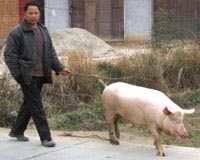| . |  |
. |
Geneva (AFP) May 18, 2009 WHO chief Margaret Chan warned Monday that the world might be facing the calm before a swine flu storm as she faced pressure from Britain, Japan and other nations not to rush into declaring a pandemic. Chan expressed her concern at the opening of the World Health Organisation's annual assembly, after a sharp rise in swine flu infections in Japan and fears that the virus could take hold in another continent beyond its source in North America. "We do not know how long this period will take, if this is the calm before the storm," Chan told the assembly, adding that there was "every reason to be concerned with the interaction with other viruses." WHO officials have warned that sustained transmission in a country in another region, without a direct link to travellers, would warrant declaration of a pandemic. At the moment there are more than 8,800 confirmed cases of the flu in 40 countries with more than 70 deaths. "We need to warn the public whenever necessary but reassure them whenever possible. This is a difficult balancing act," the WHO director general told a special debate on the new A(H1N1) virus. Chan, who can declare a pandemic after consulting a panel of scientists, acknowledged the scientific uncertainty and the need for more information on the virus that emerged in Mexico and the United States a few weeks ago. Britain's Health Secretary Alan Johnson led calls for caution, backed by New Zealand, Japan, Switzerland, the head of the Pan American Health Organisation, the WHO's regional body for the Americas as well as other countries. "I think you, as you and others have said, need more time, we need more time to study this," Johnson said, adding that it was crucial to ensure public support for the influenza alert system following the swine flu outbreak. The general public would find it "bemusing" if WHO followed a "mechanistic" plan based on future concerns without carefully considering the current severity of the virus, he added. Based on current evidence, scientists say the new virus appears to be no more dangerous than seasonal flu. "We have to alter and adapt in accordance to circumstances, and it's my belief that we need to give you and your team more flexibility as to whether we move to a phase six," said Johnson, whose comments were also endorsed by China. Within days of swine flu being signalled by Mexico last month, WHO raised the global alert to level five, one step short of a pandemic. The UN health agency is now keeping a close watch on Japan, where more than 2,000 schools were closed Monday in a bid to slow the spread of the virus and some 129 people have been infected within days. "We have lived for five long years under the threat of pandemic caused by the lethal H5N1 avian influenza virus. This has left our world very prepared but also very scared," said Chan. The WHO has emphasised that a pandemic denotes geographical spread of the virus, not the severity. Member states endorsed a decision to shorten the assembly to five days from 10 so that officials can focus on battling the flu. Chan also said WHO was standing by its decision to focus on seasonal flu vaccine production, instead of switching the priority to a swine flu vaccine. UN Secretary General Ban Ki-moon was to meet pharmaceutical companies in Geneva on Tuesday to discuss production of a pandemic vaccine, which could take up to six months to develop. Discussions on faltering attempts to eradicate polio and curb malaria or health care in poor countries have been pushed down the agenda, while debates on tuberculosis, viral hepatitis and making rules on human organ transplants could be postponed for a year. Share This Article With Planet Earth
Related Links Epidemics on Earth - Bird Flu, HIV/AIDS, Ebola
 China reports suspected swine flu case
China reports suspected swine flu caseBeijing (AFP) May 18, 2009 China reported Monday a suspect case of swine flu in its southern Guangdong province involving a man who recently returned to the mainland from Canada and the United States. The man, aged 59, was diagnosed with the A(H1N1) virus, as it is officially known, following a preliminary test in the provincial capital of Guangzhou, the health ministry said in a statement on its website. China ... read more |
|
| The content herein, unless otherwise known to be public domain, are Copyright 1995-2009 - SpaceDaily. AFP and UPI Wire Stories are copyright Agence France-Presse and United Press International. ESA Portal Reports are copyright European Space Agency. All NASA sourced material is public domain. Additional copyrights may apply in whole or part to other bona fide parties. Advertising does not imply endorsement,agreement or approval of any opinions, statements or information provided by SpaceDaily on any Web page published or hosted by SpaceDaily. Privacy Statement |